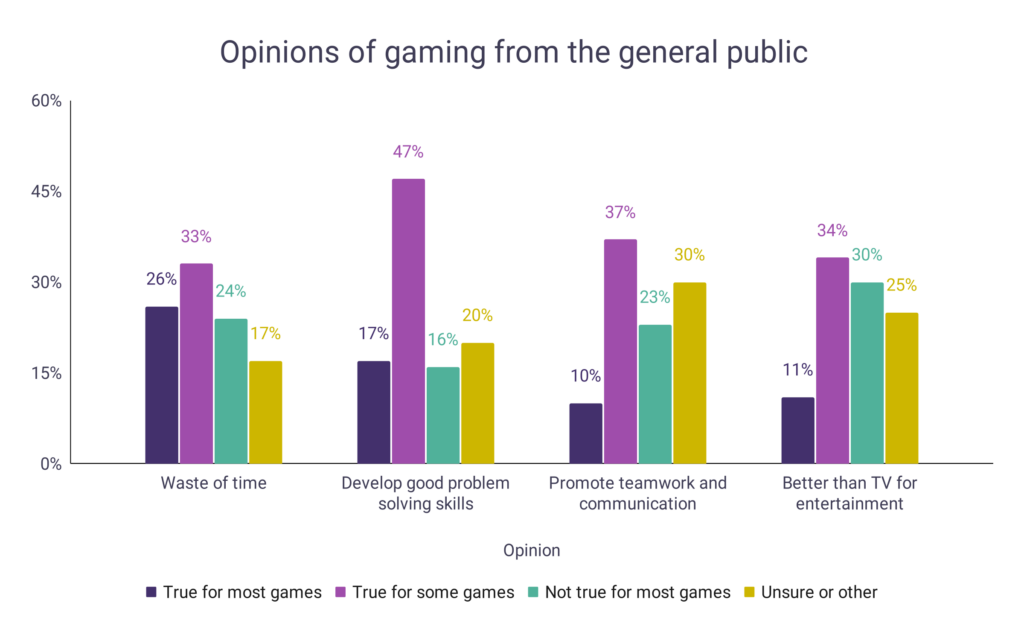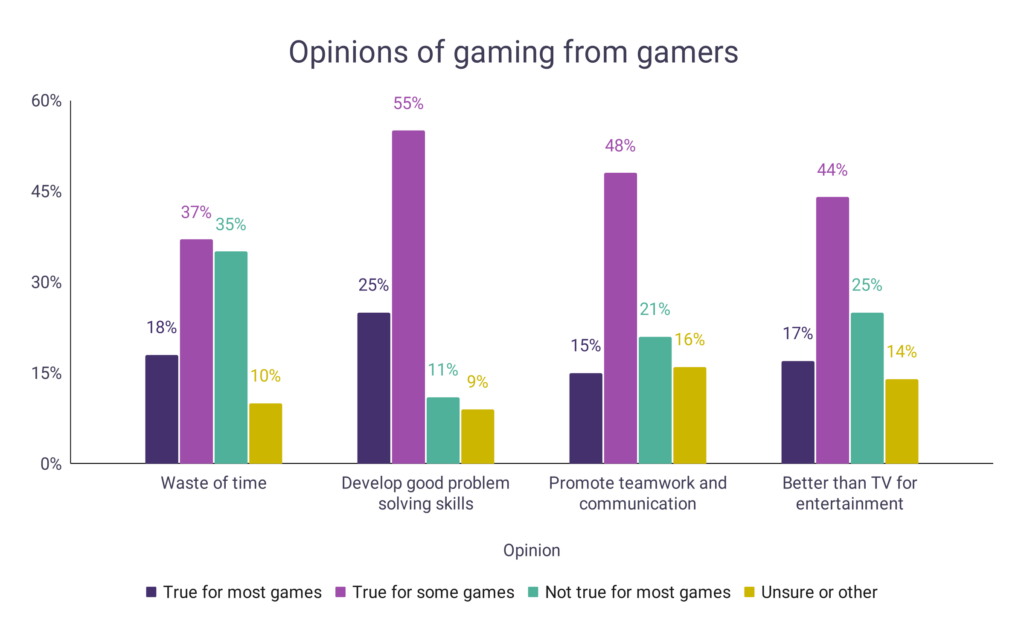The average person spends 16.2 minutes per day reading, which presents 5.2% of total leisure time on a daily basis. While reading time declined over the years, we dived into how it compares with other leisure activities, most of all watching television and playing video games.
Reading vs. playing video games
- The average person spends 9.6 more minutes per day on gaming compared to reading.
- The difference between the average gaming and reading time increased significantly over the years, from 3 minutes in 2009 to maximum 12.6 minutes in 2018.
- Since 2010, the average US citizen never spent more than 20 minutes per day reading for personal interest, and never spent under 24 minutes per day on gaming.
- During the same period, the difference between daily gaming and reading time has never been under 5 minutes.

Men play games way more than they read
- On average, men read for personal interest around 13.8 minutes per day, while they play games for about 33 minutes daily.
- This means that men spend 239% more time on gaming compared to reading books.
- This gap got bigger over the years, as it stood at 11.4 minutes in 2009, and 14.4 minutes in 2015.

- On the other hand, women spend as much time on reading as they do on playing games, with 18.6 minutes per day.
- Since 2009, women spent more time reading than gaming 6 times, more on gaming 3 times, and equal amount on both 2 times.
- However, the last time women read more than they engaged with gaming was in 2015.

Reading vs. gaming by age
- U20-year-olds spend almost the full hour more per day playing games than reading, 59.4 minutes.
- This is the largest difference between gaming and reading time in history.
- All age groups below 45 years of age spend more time gaming than reading.
- Difference in reading time vs. gaming time for over-75-year-olds reduced by 50% over the last 5 years.
| Category | Age | 2009 | 2010 | 2011 | 2012 | 2013 | 2014 | 2015 | 2016 | 2017 | 2018 | 2019 |
| Reading | 15-19 yrs | 9 | 7.2 | 9 | 6.6 | 7.8 | 6.6 | 11.4 | 7.2 | 8.4 | 7.2 | 7.8 |
| Reading | 20-24 yrs | 10.8 | 10.2 | 7.2 | 9 | 13.8 | 13.8 | 6.6 | 8.4 | 6.6 | 6.6 | 6 |
| Reading | 25-34 yrs | 9.6 | 8.4 | 9 | 8.4 | 6.6 | 7.8 | 10.2 | 9 | 6.6 | 6 | 7.2 |
| Reading | 35-44 yrs | 11.4 | 10.2 | 12 | 11.4 | 9.6 | 9 | 10.2 | 10.2 | 9.6 | 9 | 9.6 |
| Reading | 45-54 yrs | 17.4 | 15 | 15.6 | 15.6 | 12.6 | 13.8 | 13.2 | 10.8 | 12.6 | 9.6 | 15 |
| Reading | 55-64 yrs | 28.2 | 22.2 | 22.8 | 25.8 | 25.2 | 22.2 | 22.2 | 22.2 | 18 | 16.2 | 16.8 |
| Reading | 65-74 yrs | 42 | 39 | 36 | 40.8 | 44.4 | 37.8 | 39.6 | 33.6 | 34.8 | 36.6 | 31.8 |
| Reading | 75 yrs and over | 61.8 | 56.4 | 48 | 58.2 | 57.6 | 65.4 | 61.2 | 51.6 | 51 | 48 | 43.8 |
| Playing games | 15-19 yrs | 53.4 | 55.2 | 64.2 | 50.4 | 52.8 | 54 | 64.8 | 55.2 | 63 | 61.8 | 67.2 |
| Playing games | 20-24 yrs | 25.8 | 43.2 | 43.2 | 50.4 | 42.6 | 51 | 43.2 | 40.2 | 61.2 | 57.6 | 48.6 |
| Playing games | 25-34 yrs | 24 | 22.8 | 24.6 | 24 | 24.6 | 23.4 | 21 | 27.6 | 28.2 | 34.2 | 31.2 |
| Playing games | 35-44 yrs | 17.4 | 18.6 | 18 | 16.8 | 16.8 | 16.8 | 15 | 13.8 | 12.6 | 16.8 | 16.8 |
| Playing games | 45-54 yrs | 15.6 | 13.2 | 16.2 | 18 | 16.2 | 17.4 | 15 | 13.2 | 18 | 13.2 | 13.2 |
| Playing games | 55-64 yrs | 17.4 | 18.6 | 19.2 | 16.2 | 21 | 21.6 | 19.2 | 16.2 | 17.4 | 19.2 | 13.2 |
| Playing games | 65-74 yrs | 22.8 | 21.6 | 25.2 | 24 | 31.8 | 28.2 | 26.4 | 28.2 | 28.8 | 23.4 | 19.8 |
| Playing games | 75 yrs and over | 25.8 | 26.4 | 22.2 | 22.2 | 24 | 28.8 | 27 | 27.6 | 25.8 | 25.8 | 25.8 |
Reading vs. gaming during pandemic
- Even though reading time was up during 2020 (May to December) by 4.2 minutes per day, gaming time increased by 11.4 minutes daily.
- During pandemic, people spent 16.8 more minutes per day gaming than reading, making the gap 39% bigger compared to before the pandemic.
- That is also the biggest difference between gaming and reading time in history.
- The difference is especially noticeable in male population, who spent 31.2 more minutes playing games than reading books.
- Women also played games more during pandemic, 3.6 minutes more per day.

Benefits of reading vs. gaming
As forms of entertainment, reading is well-known as a beneficial activity, whereas games are often seen in a worse light. Typically, reading requires a larger amount of effort and is more engaging when compared to gaming, although some games do require players to be extremely alert.
- The ability to read requires a high level of sustained and focused attention.
- Readers must process each word and understand their overall meaning whilst also using their own imagination and critical thinking skills.
- Video games provide a high level of visual and auditory stimulation, although the attention required is not typically as sustained.
- Imagination and creativity are encouraged through reading, as readers need to imagine scenes and characters.
- Although gaming can be creative at times, limitations are put into place by those that have designed each game.
- Learning new information and skill development is commonplace through reading, where readers are provided with different ideas and perspectives
- Video games can also be educational but the skills learned are typically more focused on problem-solving or developing one’s hand-eye coordination.
- Whereas reading is typically done as a solitary activity (with the exception of read-alouds or book discussions), games can be either single or multiplayer.
Reading vs. gaming effect on health
Reading effect on health
- Healthier lifestyle choices, increased life satisfaction and longer life expectancy have all been associated with those who enjoy reading.
- A study has shown that 6 minutes of reading can reduce stress levels by 68%.
- A reduction in mortality of 20% has been observed in book readers when compared with non-book readers.
- Reading is a healthy, low dopamine activity that requires a higher level of effort compared to other activities.
- Due to this it is typically considered to be more rewarding, and readers are 10% more likely to report having higher levels of self-esteem than non-readers.
Gaming effect on health
- If enjoyed in a healthy and recreational manner, video gaming can improve an individual’s motor skills, decision-making and multi-tasking.
- Although gaming can reduce stress levels by 21%, it can leave gamers with higher heart rates than before they start the activity.
- As with other sedentary screen-based activities, gaming is linked with an increased risk of cardiovascular disease and premature mortality.
- Video game addiction can negatively affect several areas of a person’s health, both physically and mentally.
- It is common for gamers to report suffering from anxiety and depression caused by reduced dopamine levels which arise from the activity.
Reading vs. gaming effect on brain
Reading effect on brain
- The mental visualization that is required when reading is better able to stimulate the brain when compared to other forms of entertainment.
- One study showed that improved cognitive/school tests had a positive association with reading activities.
- 82% of US-based adults surveyed agree that reading physical books helps to improve focus.
- 79% say that it helps with outside-the-box thinking and 74% believe that it helps to develop problem solving skills.
- Readers also often have much larger vocabularies than non-readers, which is linked to learning new words contextually through text.
Gaming effect on brain
- Children who game for 3 or more hours daily have shown links to better performances on tests involving impulse control and working memory compared to children that never play games.
- Action games have shown a high association with the ability to direct attention and filter specific information.
- Puzzle games have been associated with increased navigation, perception and recognition skills.
- Despite this, gaming’s effect on dopamine is extreme compared to other activities, which when unchecked can lead to high libido, aggression, stress and weak impulse control.
- Better results on cognitive/school tests have also shown little to no association with video gaming.
Opinions of gaming from the general public and gamers
Typically, attitudes towards the majority of video games from the general public are quite negative.
- A 2015 study found that 26% of the general public believe that most games are a waste of time (compared to 18% of gamers).
- 17% of the general public believe that most games develop good problem solving skills (compared to 25% of gamers).
- 37% of the general public believe that some games promote teamwork and communication (compared to 48% of gamers).
- 11% of the general public believe that most games are better than TV for entertainment (compared to 17% of gamers)
| Opinion on video games from general public | True for most games | True for some games | Not true for most games | Unsure/other |
| Waste of time | 26% | 33% | 24% | 17% |
| Develop good problem solving skills | 17% | 47% | 16% | 20% |
| Promote teamwork and communication | 10% | 37% | 23% | 30% |
| Better than TV for entertainment | 11% | 34% | 30% | 25% |
A graph is given below to show the opinions of gaming from the general public:

In contrast to the opinions of the general public, gamers are more likely to report positive associations with video games.
| Opinion on video games from gamers | True for most games | True for some games | Not true for most games | Unsure/other |
| Waste of time | 18% | 37% | 35% | 10% |
| Develop good problem solving skills | 25% | 55% | 11% | 9% |
| Promote teamwork and communication | 15% | 48% | 21% | 16% |
| Better than TV for entertainment | 17% | 44% | 25% | 14% |
A graph is given below to show the opinions of gaming from gamers:


